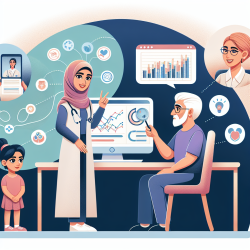The intersection of enhancement technologies, ethics, and society presents a rich tapestry of opportunities for practitioners in the field of online therapy. The research article "Enhancement, Ethics and Society: Towards an Empirical Research Agenda for the Medical Humanities and Social Sciences" provides valuable insights into how these elements can be leveraged to improve practice and navigate ethical challenges.
The Role of Empirical Research
Empirical research offers a grounded approach to understanding the nuances of enhancement technologies and their societal implications. By focusing on real-world applications and outcomes, practitioners can gain a deeper understanding of how these technologies interact with ethical considerations and societal norms.
- Cognitive Enhancement: The use of pharmaceuticals for cognitive enhancement is a key area where empirical research can inform practice. Understanding the societal context and cultural differences in the use of these substances can help practitioners make informed decisions about their application in therapy.
- Sociotechnical Networks: Examining the networks that enable and sustain the production and consumption of enhancement technologies can provide insights into their broader societal impact. This knowledge is crucial for practitioners who wish to engage ethically with these technologies.
- User Perspectives: Engaging with the perspectives of users of enhancement technologies can reveal diverse meanings and experiences associated with their use. This understanding can enrich therapeutic practices by aligning them more closely with clients' lived experiences.
Navigating Ethical Dilemmas
The ethical landscape surrounding enhancement technologies is complex and multifaceted. Practitioners must navigate these challenges with sensitivity to societal contexts and cultural differences. The research highlights several areas where ethical considerations are paramount:
- Regulation and Governance: Understanding how legal frameworks shape the development and use of enhancement technologies is crucial for ethical practice. Practitioners must be aware of regulatory environments to ensure compliance and advocate for responsible use.
- Diversity and Identity: Enhancement technologies often intersect with issues of gender, ethnicity, and identity. Practitioners should be sensitive to these dynamics to provide inclusive and equitable care.
- User Empowerment: Empowering users to make informed decisions about enhancement technologies requires a nuanced understanding of their potential benefits and risks. Practitioners should facilitate open dialogues that respect clients' autonomy while providing guidance based on empirical evidence.
A Call to Action for Practitioners
This research underscores the importance of integrating empirical findings into practice. By engaging with ongoing research in medical humanities and social sciences, practitioners can enhance their skills and contribute to more informed bioethical discussions. This engagement not only benefits individual practice but also enriches broader societal discourse on enhancement technologies.










